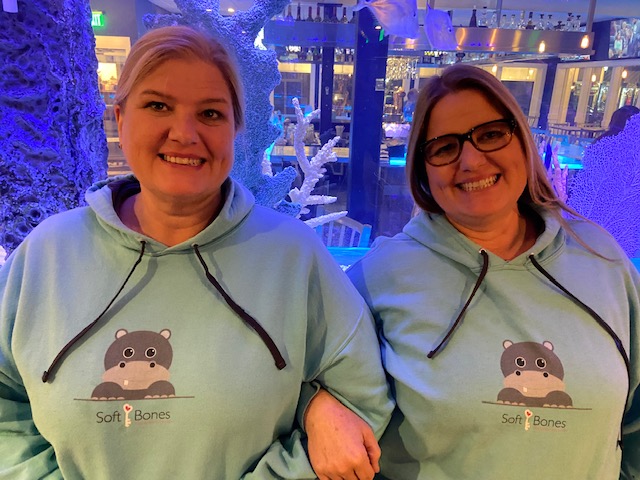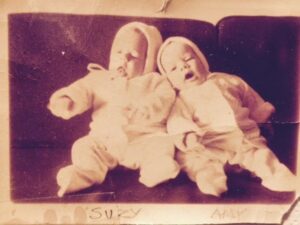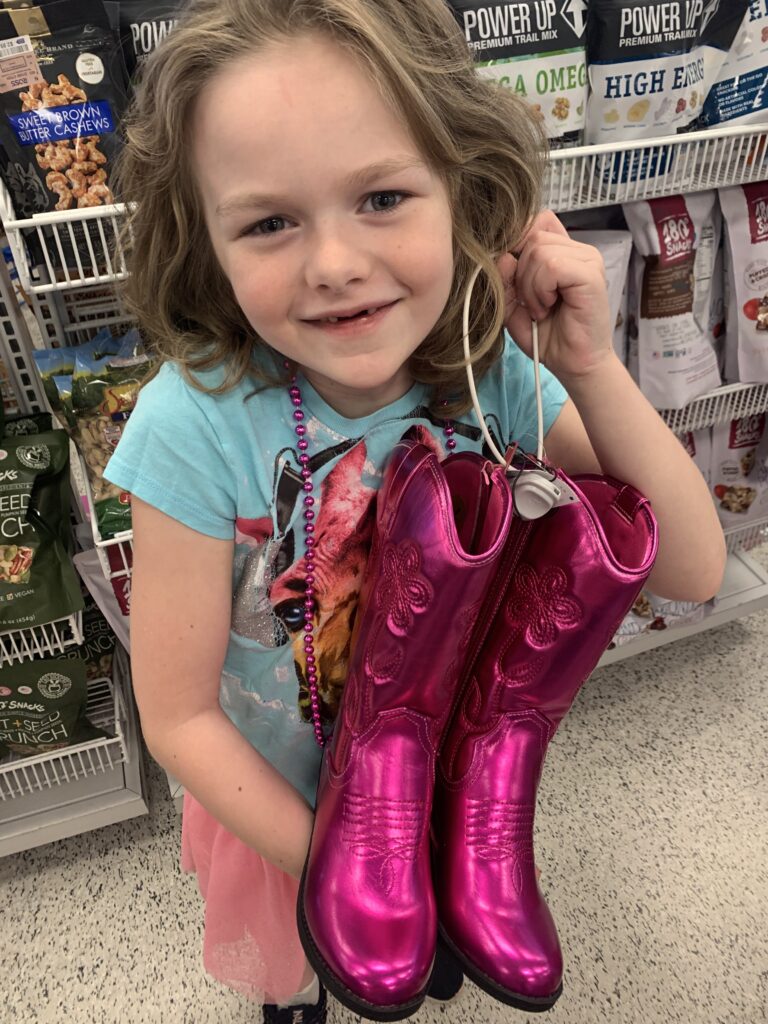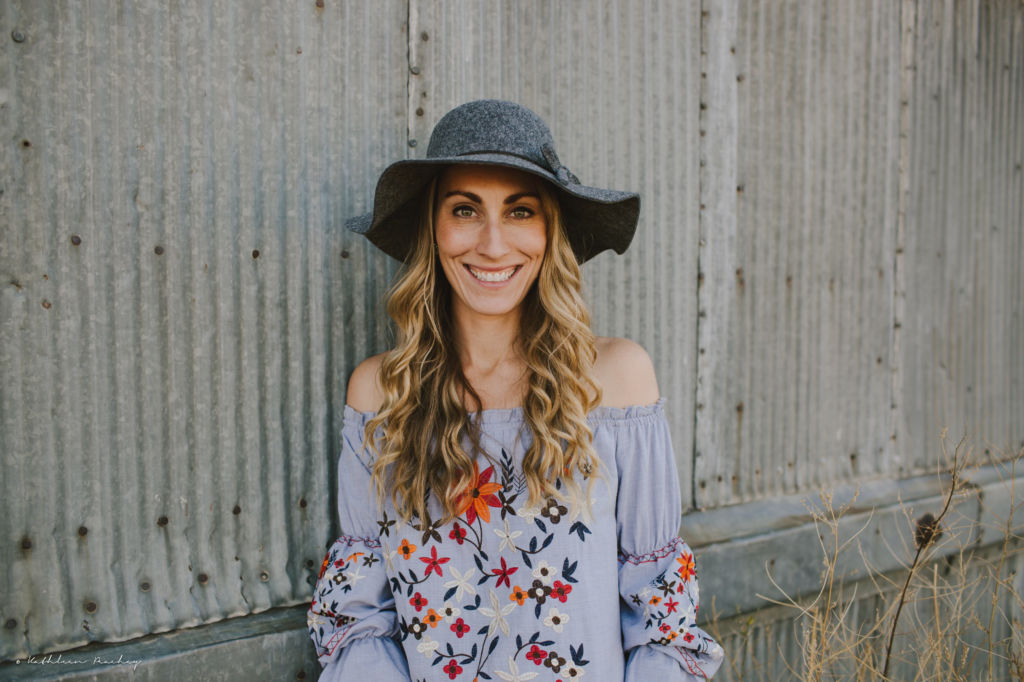Patients of the Month- Amy and Suzanne

Hi, we are twin sisters Amy and Suzanne, we have been dealing with symptoms of HPP for a lifetime. Our diagnosis seemed as though it took several lifetimes to finally get a diagnosis. Family members were either misdiagnosed or undiagnosed. We’d like to think that today Amy would have been diagnosed when she spent over a month in the hospital as an infant. Perhaps our grandma would have been diagnosed, treated, and been able to walk for the last thirty years of her life.

Growing up we knew that something was not right. We felt shame in school as we tried to keep up with other kids. We pushed ourselves but our bodies let us down again and again. Amy had a speech problem and endured years of humiliation. She resorted to talking without using ‘R’s and ‘S’s to avoid being made fun of.
Suzanne’s first memory of going to a doctor was our mother telling her not to tell the doctor about her headaches. Our mother said, “Don’t tell the doctor. You’ll just send them on a wild goose chase.” That was our mother’s, and her mother’s, life experience.”Doctor’s won’t be able to figure out what’s wrong with you, and in the process, they will belittle you and make you feel stupid.”
Suzanne had periods in her life when all of her teeth were loose but she didn’t tell anyone. When you add this type of symptom to the long list of others it feels crazy. Brain fog, depression, anxiety, endless bone pain, unexplained joint problems, migraines, muscle aches, eye problems, ringing in the ears. Doctor after doctor said all would be solved by just losing weight, eating better, and sleeping more.
Looking back, we see our endless search to find the impossible solution to feeling better. Comfort food, Tylenol, hot baths, giving up dairy, wheat, gluten, eggs, meat, sugar, losing weight, gaining weight, exercise, and vitamins. In graduate school, a doctor told Suzanne to take three ibuprofen every four hours. She did that for over twenty years, always chasing pain. In her forties, she added alcohol to the mix. Alcohol, though her body did not tolerate it well (luckily!), was the most effective source of pain relief. She wished she could drink more but it was a totally impractical and unhealthy solution.
In our fifties, we began a text group with our older sisters, daughters, and nieces. We called it the “Achy Girl Group.” The younger generation gave our silent struggles a voice. We had lived a lifetime with the motto, “Suck it up and do your chores.” Our children knew better. They didn’t want to just beat themselves into working harder, and they were no longer able to push through the way we had. We all had so many odd overlapping symptoms. Our niece led the way, having done her own research years earlier. She thought she had hEDS. After seeing countless doctors she learned she had POTS, a form of dysautonomia. Others in the group had been diagnosed with fibromyalgia. Many doctors later discovered that several of us also have Dysautonomia, but it didn’t account for all of our symptoms. At that point, Amy figured it had to be genetic. When no doctor would give her genetic testing she ordered genetic testing online from Invitae. Months later the test came back in an email with hypophosphatasia. So Amy Googled HY-POP-HOSP-HAT-ASIA late one night and found the Soft Bones group. When Amy told Suzanne this she also googled it. Suzanne’s first thought was that there was no way we had that. We hadn’t broken any large bones. We only have minor bone deformities. We survived infancy. The Achy Girl Group thought Amy was so desperate for answers that she was clinging to a far-fetched diagnosis.
Then Suzanne joined the Soft Bones group on Facebook and saw herself and her lifetime of symptoms in the posts and comments of others there. There was nowhere online that talked about the wide variety of symptoms as well as the members of the Soft Bones group. Understanding the experiences of so many others with HPP convinced her that we belonged in the group.

Having genetic confirmation, we then went to a geneticist who said she specialized in HPP at a major well-respected university health care system. We waited months for an appointment and went there hopeful that we had finally found the answer to our medical mystery. To our disbelief the doctor told us we didn’t have HPP. She said our mutation did not cause disease, and that she only treated patients with ALP in the single digits. She had no answers for us. We were told to “go home and wait ten years for science to catch up with you.” She said, “Stop going to doctors. You’ve come to the end of your search.” We left there crushed. At that point, we were having trouble getting up and downstairs. The daily pain was becoming unbearable. Brain fog made it hard to do our jobs. Our children and grandchildren were affected. We couldn’t wait ten years. We couldn’t give up.
That’s when we reached out to Soft Bones and had a phone conversation with Deborah and Denise. Thinking about that conversation brings back tears. They believed us. They gave us the names of the best HPP doctors in the country and a path forward. It was a life-changing conversation. Months later one of these specialists officially gave us our clinical HPP diagnosis. She discovered that we also have hyperparathyroidism, which raises your ALP, making us a very hard case for less experienced doctors to diagnose. Because of her depth of knowledge, and desire to help, she knew just what to look for.
After a lifetime of searching, and 18 months after our Invitae genetic test showed HPP, we are finally being treated. Now, we realize this is just the beginning of our journey with HPP. For ourselves, and our children and grandchildren, there is much to be studied and understood. Because of Soft Bones, we have hope.
For most of our life, others around us would say they saw us as strong and capable. We worked so hard to overcompensate that people would describe us as super women. Having an undiagnosed or misdiagnosed, rare, painful, debilitating disease is awful. But there are blessings that come with the burden. Looking back, we see that the difficulties we have endured since childhood have given us tenacity and persistence. We learned to step around any obstacle as creative problem solvers. When we are not able to use our bodies in a way many take for granted we find smarter solutions. We still struggle with the definition of ‘disability’ and allowing others to see us struggle but we are making progress every day.
The hardest thing to overcome with HPP, and other misunderstood or not at all understood medical conditions, is learning to be kind to ourselves, to love our bodies as if they were a child or sister, and to not feel ashamed of our size, appearance, or shortcomings. Our bodies are doing the absolute best they can to be healthy and strong. We shouldn’t feel shame but instead, pride in our struggle. We persevered for years and overcame great challenges to be diagnosed. We are proud of our diagnosis and consider it an honor to be able to help others with HPP. Growing up being blamed or shamed for our symptoms makes us want to help others find their way to help and treat with dignity and compassion.
The biggest challenge of HPP is living with chronic and often unbearable pain. We may look ‘normal’ but we live with many different kinds of pain. Imagine if all of your bones hurt, all of your muscles ached, and many of your joints were messed up, but your doctors, and even most of your friends and loved ones, and most importantly even you, didn’t understand why. It is a constant battle to remain positive. Many of the symptoms of HPP are whole and complicated medical issues within themselves, requiring their own set of diagnoses and specialists. Before diagnosis, and with depression, anxiety, and brain fog thrown into the mix, it can make you feel crazy. After diagnosis there are periods of grief, and relief at understanding the root cause. Symptoms and treatment are very individual. We all have to find our own path forward to ease, or live with, the pain, and to accept that our life may not be what we dreamed it would be. In many circumstances, people with HPP have to study the disease for years just to be able to talk to doctors who know far less and convince them to not stand in the way of treatment.
We grew up ashamed of ourselves, feeling stupid and pushing ourselves through brain fog and pain to work harder. We were often the hardest workers in any group. Yet, we always knew there was something wrong with us. Amy once had a doctor tell her she couldn’t have HPP because she could get up from a chair. We wish more doctors knew what to look for. Suzanne wishes they would have been able to look at her and see not just a fat woman, not just potential heart disease and diabetes, but looked further to find the true root of her symptoms. Most of all we wish other people would not have to suffer a lifetime before getting help. We want people to know that HPP is real, probably much more common than we know, can make itself known to the patient at any age, and with a great variety of symptoms. As identical twins with HPP we are proof that HPP can present with a great variety of symptoms even among ones with the same gene variant. We want doctors to know what to look for and how to treat HPP.
It’s hard to imagine our lives without Soft Bones, mostly because the reality is that it would be so sad. The pain in our legs at night made us dread going to bed. It made us dread waking up in the morning. To see your sisters suffer without answers, and to suffer yourself, to think of your children and grandchildren living with the same burden, is too much. Without Soft Bones, we would have had to settle for a doctor who told us to “stop going to doctors,” and, “wait ten years for science to catch up with you,” as our primary source of help. We hate to say it but suicide was something we each were thinking about. We don’t know if we would have given up, or what that would have looked like, but we feel overwhelmingly grateful every single day that we don’t know what our lives would have looked like now without Soft Bones.
If you would like to make a donation to Soft Bones, in honor of Amy or Suzanne, please click here.







Responses